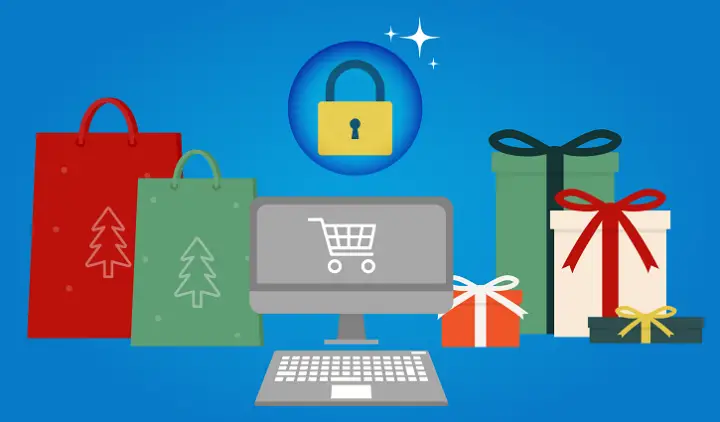What Are Holiday Scams and How to Avoid Falling for One?

The holiday season is a time to unwind, celebrate, and give back. But did you know you are more likely to let your guard down and miss those critical warning signs of a scam during the festive period?
According to a Harris Poll report, one in three Americans takes more risks while attending to their seasonal shopping online. This is why scammers get extra busy throughout the holidays. For them, it is an opportunity to find victims when they are vulnerable the most.
In this article, we discuss what holiday scams involve and how you can avoid them and enjoy your time with loved ones with absolute peace of mind.
What Are Holiday Scams?

These include any type of scam designed to dupe unsuspecting victims during the holiday season as they shop for gifts, plan to make charitable donations, book their travels, or even look for seasonal jobs to make some extra cash.
Here are common holiday scams that can cause you trouble.
● Fake discounted deals
In-store and online shopping peaks during the holidays as consumers go bargain-hunting to find the best deals in town.
Every retailer slashes prices in a bid to attract more shoppers. Scammers get activated, too, circulating ads, emails, and social media messages touting fake deals and promotions. And when you click on them, they will take you to websites with too-good-to-miss discounts on popular gift items and holiday essentials. Once you pay, that would be the last you hear of them. If you are lucky, you might receive a lower-quality or counterfeit product.
● Website spoofing
Cloning online stores of popular retailers is also common during the holiday times. Without realizing it, customers could browse catalogs and purchase products on spoofed sites, giving away their money, credit card details, and other sensitive information to cybercriminals.
● Delivery scams
Last year, consumers placed $211.7 billion worth of online orders in the holiday season. This creates an excellent entry point for scammers.
They may, for example, impersonate a well-known retailer or delivery service and call or send you emails and messages, asking you to verify your delivery information. Or they may send a missed delivery notice, requesting you to call them back. When you do, they may seek sensitive personal data under the pretext of confirming your identity.
These scams are often designed to solicit identity-related details, from your SSN to bank account numbers, and commit identity theft and related crimes.
● Gift card fraud

For many people, gift cards are a popular choice for gifting. But if you are not careful, you could fall for one of the many scams involving them. For instance, you might purchase fake or tampered gift cards or discounted ones that require hefty activation fees.
Scammers could also impersonate a senior executive in your company or a loved one and get you to purchase gift cards on their behalf and share the card numbers and PINs.
● Phishing emails
Fraudsters can mimic retailers and marketplaces, such as Amazon, to phish for your personal information.
They may, for example, ask you to log in to your retail account using an email link to verify a purchase or a delivery address. But when you click the link, you will be taken to a spoofed site, which will steal your account login credentials. After that, criminals could access your shopping account and make purchases using your saved credit card information.
● Fraudulent charities
When charitable giving is at its highest during the holidays, scammers could mimic well-known non-profits to swindle your donations.
● Fake travel deals
During peak travel times, fraudsters often promote fake travel packages, flights, hotel rooms, and tours that don’t exist.
● Seasonal job scams
A fraudulent employer could ask you to make an upfront payment to apply for a job or purchase the material required to perform the assigned tasks. Some may provide you with a fake check for you to deposit and buy office supplies. Thinking it has cleared, you may spend your own money on the purchases and return the balance to the employer. But a few weeks later, you find out you were duped when the bank officially notifies you of the bounced check.
Essential Steps to Avoid Holiday Scams

The types of scams you can encounter during the holidays are many. So, keeping your guard up is imperative for safeguarding yourself against them.
Here’s what you should know:
- Keep a list of all your purchases and track them carefully. Open a folder to save emails you receive during payment confirmation so you can compare any communications you receive later against them to verify the information.
- Take time to research retailers, charities, and any other organization before responding to or acting on their communications.
- Avoid hard-to-believe deals. If the price is unusually low, you could end up with a lower-quality item.
- Buy products and gift cards from reputed retailers and marketplaces. The latter will have buyer protection to safeguard your purchases from unknown vendors.
- Check the website URL before purchasing. If it is different from the regular site address of a retailer, even by a single letter, it is likely a fake. To be safe, directly type in the web address of retailers you are familiar with instead of using unverified links.
- Ignore unsolicited links and attachments. These could download malware.
- Avoid saving your bank or credit card information on your online accounts, apps, browsers, and devices.
- Never use phone numbers provided via messages and emails to contact a product or service provider. The general hotline listed on their website is a safer alternative.
- To verify people behind calls and messages, reverse search their phone numbers on PhoneHistory.
- Before responding, authenticate emails using a search engine or an online search tool.
To Conclude
Holidays are a time to spread love, joy, and kindness. However, you must also be extra vigilant to protect yourself from fraudulent advances that often peak during the festivities.
Fake discounts, delivery scams, gift card fraud, spoofed websites, and phishing emails all surge in numbers as more consumers get busy with their shopping. Charity, travel, and seasonal job scams are other deceptive activities to watch out for.
Adopting strict verification measures and keeping your personally identifiable information safe is essential for avoiding these threats. Remember, practicing caution will never go to waste when you want to enjoy the holidays with your loved ones and create cherished memories.
